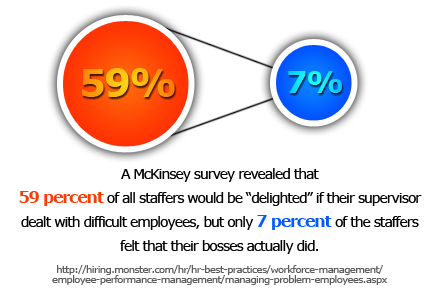 By LISA SWAN
By LISA SWAN
One of the things that make difficult employees tough to deal with is that they may be completely unaware that they are being difficult. If you want to move up in your career, you may need to do some soul-searching as to whether you are a difficult employee. Here are some ways to determine whether you fit into that category:
Being unreliable
If you are the type of employee who treats deadlines as mere suggestions, and does not get your work done on time, you are going to end up looking like a flake at the office instead of management material. Your supervisor gives you deadlines on assignments for a reason – that’s when he or she needs the work done. It’s one thing if unforeseeable circumstances prevent you from meeting your deadline one time, but if you constantly have to explain why you didn’t get your work done on schedule, you may need to rethink the way you do your job.
Questioning authority
It is one thing to voice an opinion about workplace issues when asked. It is another thing to show a lack of respect for your boss’s authority. Even if your supervisor is a droning dolt, or an annoying micromanager, your boss is still your boss. Constantly questioning your manager’s authority will get you nowhere, even if you happen to be right. At a certain point, you have to either grin and bear it, or find another job.
Constantly complaining
While you shouldn’t have to suffer in silence in your workplace and never bring anything to your supervisor’s attention, pick your battles. If you find yourself complaining about everything, your boss may start seeing you as the problem, and not the issues you bring up. Managers have a lot on their own plates; they do not want to spend much time dealing with constant complaints.
Not getting along with your co-workers
Playing nice with others is one of the more underrated qualities in an employee. If you constantly get into disputes with your co-workers, your boss is going to ultimately blame you, not them, for the problem, no matter how disagreeable they are. Even if you do not have overt disagreements with your co-workers, but just make passive-aggressive gossipy comments about them, that will not go unnoticed. You don’t have to be best friends with your co-workers, but you need to make sure that you can still get along well enough to get your job done.
Bringing the drama
Life is hard. Stuff happens. We all know that, but your boss and your co-workers aren’t really interested in hearing every detail on how life has gotten you down. Nobody wants to h a daily litany of complaints about your personal life. Save the daily drama for your friends and personal confidantes, and leave it outside the workplace.
Not being there
If you are the type of employee who just happens to always get sick on a Monday or Friday, and who is always at the edge of running out of annual leave time, you are not impressing your supervisor – or your co-workers. The same goes with those employees who come in late, take long lunches, and leave early. If you don’t take your job responsibilities seriously, and act like an adolescent skipping school, chances are that your boss won’t take you seriously.
Doing slipshod work
If you cannot do what is expected of you at the workplace, and your supervisors and co-workers have to help you do your job, do not expect to move up the corporate ladder. That means that you need to put time and energy into your work. If you treat your work assignments like term papers that you are writing the night before they are do, your boss will notice.
